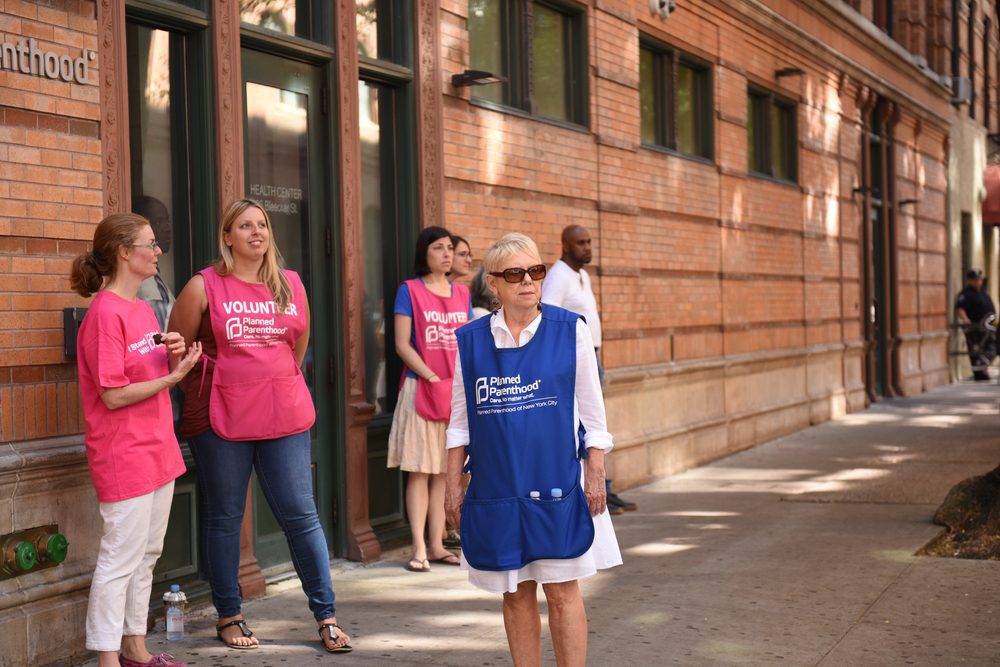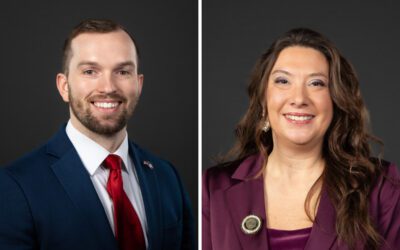
The crowd at the Capitol for the July special session to ban abortion Nikoel Hytrek/Iowa Starting Line
With Iowa’s abortion ban in effect and the threat of a national abortion ban at the federal level, volunteers are using their free time to talk to voters about reproductive rights and how to protect them.
It was a sunny, warm Saturday morning in early October when a group of about 10 volunteers gathered in a campaign office in Ankeny.
They were getting ready to knock on doors for Iowa State Reps. Molly Buck and Heather Matson, Democrats who represent different parts of Ankeny in the Iowa House.
The door-knocking event was organized by Planned Parenthood Advocates of Iowa, in connection with the Buck and Matson campaigns, and the volunteers were there because they wanted to protect reproductive rights in the state.
“The whole idea is to be sure that incumbents who are champions [for reproductive rights] get reelected,” said Phyllis Peters, who had driven about 30 minutes from Ames to volunteer.
Another goal, she said, is to flip the districts of some legislators who have played key parts in stripping reproductive rights from Iowans.
One of those legislators is Sen. Brad Zaun, a Republican from Urbandale who voted for Iowa’s near-total abortion ban in 2023—and every restriction on reproductive rights that has come up since at least 2013.
The abortion ban went into effect at the end of July after the Iowa Supreme Court removed the block that had kept the ban from being enforced for almost a year. The court also ruled abortion bans should be harder to overturn.
To Peters, that’s unacceptable.
“Everybody’s different,” Peters said. “[Legislators] don’t have the expertise that a medical team has. They don’t have the ability—they shouldn’t have the ability—to define what a woman can or cannot do. And it just blows my mind that they think that they have that ability.”
A majority of Iowans agree with her. According to the latest Des Moines Register poll, 64% of Iowans think abortion should be legal in most or all cases, and 59% oppose the near-total ban, which bans abortion when electric pulses are detected—which can happen as early as six weeks—earlier than most people know they’re pregnant. A ban at this stage of pregnancy prohibits nearly 98% of abortions in Iowa.
“That’s not what legislators were ever intended to do,” Peters said. “We have legislators in our state to take care of the common good and to do what can’t be done by individuals and the private sector.”
Health care
She said she wished legislators would focus on issues like public education, economic development, water quality, and nursing homes instead of restricting access to reproductive health care.
Kathy Jones, an Ankeny resident, is concerned about her three grandchildren being able to get necessary health care in the future.
“My sister-in-law had two ectopic pregnancies, and those would be really endangering her life at this point had it been now and not years ago,” she said.
Back then, Jones said, there wasn’t a delay in getting the care her sister-in-law needed—but that hasn’t been the case for thousands of women since the US Supreme Court overturned Roe v. Wade in 2022.
Since then, patients across the United States have been denied care, or the care has been delayed until patients are so sick they need more extreme medical interventions to save their lives. Some have died, or lost reproductive organs.
Jones wants her grandchildren to be able to get whatever care they need and to have the freedom to make choices about their lives.
“I think those decisions should not be made by our government,” she said. “They need to be made locally in an office with a physician and other family members.”
People animated by reproductive rights
Peters said that since the overturning of Roe, many women she knows have started talking about abortions they got earlier in their lives—because of miscarriages, pregnancy complications, or the fact that they couldn’t afford pregnancies at that point in their lives.
In many cases, she’s never heard those stories before.
One was a cousin whose first pregnancy ended with an abortion because she experienced complications. That abortion allowed her to eventually have two healthy children who Peters has known and loved their whole lives.
“What would their lives be like if they had been obstructed from making that decision, and if they had not had access to the care that they needed at the time in their young lives, where they were ready to set a course that did not at that time include an unintended pregnancy?” Peters said.
“When people are telling their stories, there’s a lot of both anger and disbelief that we should be fighting this again,” she continued.
Peters and Jones said that storytelling is part of what makes door-knocking so inspiring and effective.
That Saturday, the goal was to knock on the doors of people who were likely to vote and to make sure they had plans for getting to the polls.
Jones said talking to people face-to-face can help set the tone and help people think about issues like reproductive freedom in a different way. Voters have been happy and interested to talk to her, she said, and they appreciate the “personal touch” of a conversation.
“Having conversations means a lot more than just hearing things on social media or on television or wherever one’s getting their, quote, ‘information,’” she said.
Peters said talking to people who are excited to vote is as motivating for her as it is for them. Connecting to voters that way also provides more incentive for people to follow through because they’ve told another person they were going to go vote and shared their plans.
On that Saturday, Peters was paired with another woman while they knocked on doors, and she said they fed off of each other’s excitement as much as they did the voters’.
“It’s reaffirming to the voter, and it certainly is for me, the volunteer, to have that face-to-face and hear them say ‘I’m with you guys on the issues,’ or to hear them enthusiastically say they’re looking forward to voting,” she said.
Support Our Cause
Thank you for taking the time to read our work. Before you go, we hope you'll consider supporting our values-driven journalism, which has always strived to make clear what's really at stake for Iowans and our future.
Since day one, our goal here at Iowa Starting Line has always been to empower people across the state with fact-based news and information. We believe that when people are armed with knowledge about what's happening in their local, state, and federal governments—including who is working on their behalf and who is actively trying to block efforts aimed at improving the daily lives of Iowan families—they will be inspired to become civically engaged.


House GOP fast-tracks budget bill that would cut off Medicaid funding to Planned Parenthood
The budget package proposes steep health care cuts—and includes a new push to block patients from accessing reproductive care. In a 30-24 party-line...

Report: Majority of pregnancy-related deaths in Iowa could have been prevented
A newly released report found that 95% of pregnancy-related deaths in Iowa were preventable, and those deaths disproportionately affected women who...

Shattering stigma: Iowa woman shares her abortion story to empower others
There are different types of people who seek abortions. Here is the story of one of those women—the everyday woman who accidentally got pregnant....

New Iowa bill would ban abortion pill, sparking backlash
Republican proposes bill to effectively end 74% of abortions in Iowa by banning a pill that’s safer than penicillin and Viagra. Seventy-four...

Way more Americans are getting sterilized since Roe was struck down, research finds
A new study has found that from May to August 2022, vasectomies surged by 95% and tubal sterilizations increased by 70% among adults ages 19 to 26....

People are leaving states with abortion bans, according to study
A new analysis from the National Bureau of Economic Research found that since 2022, states with near-total abortion bans appear to have lost 36,000...





